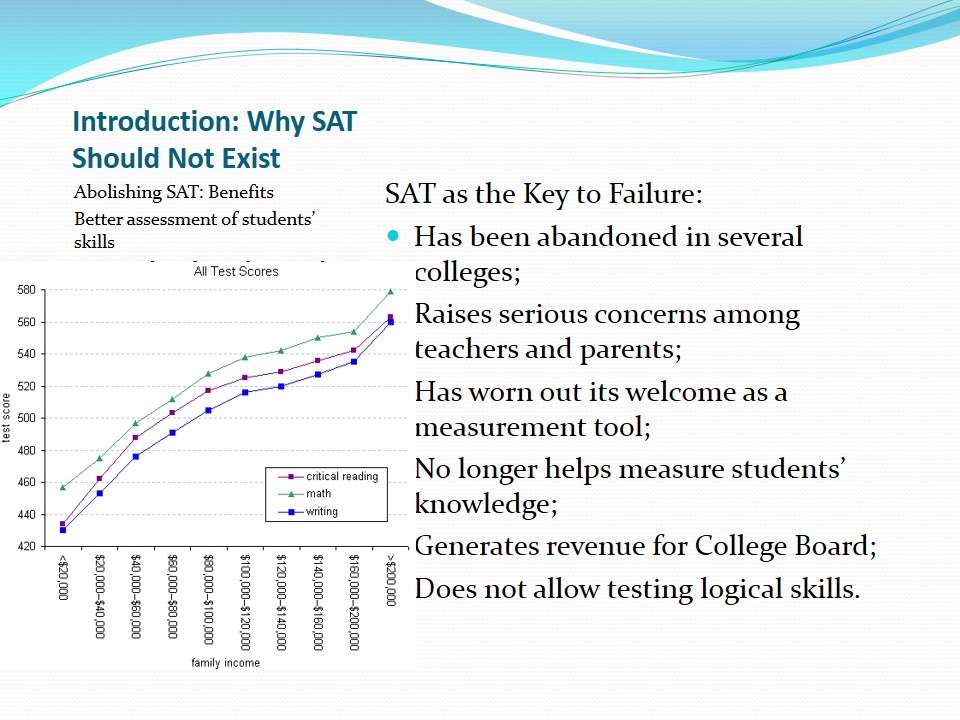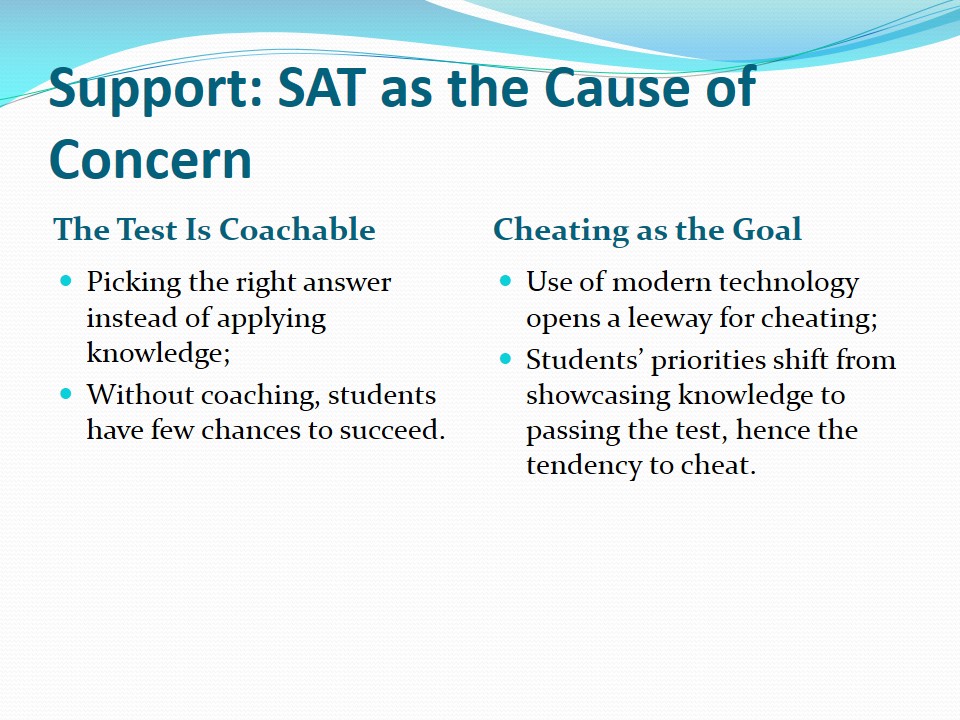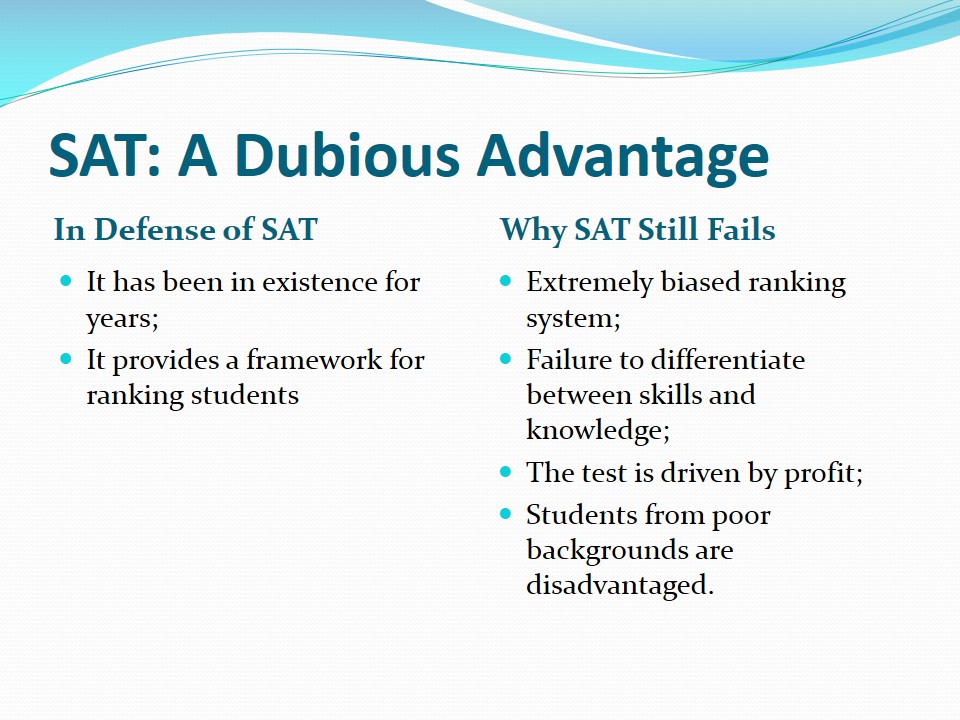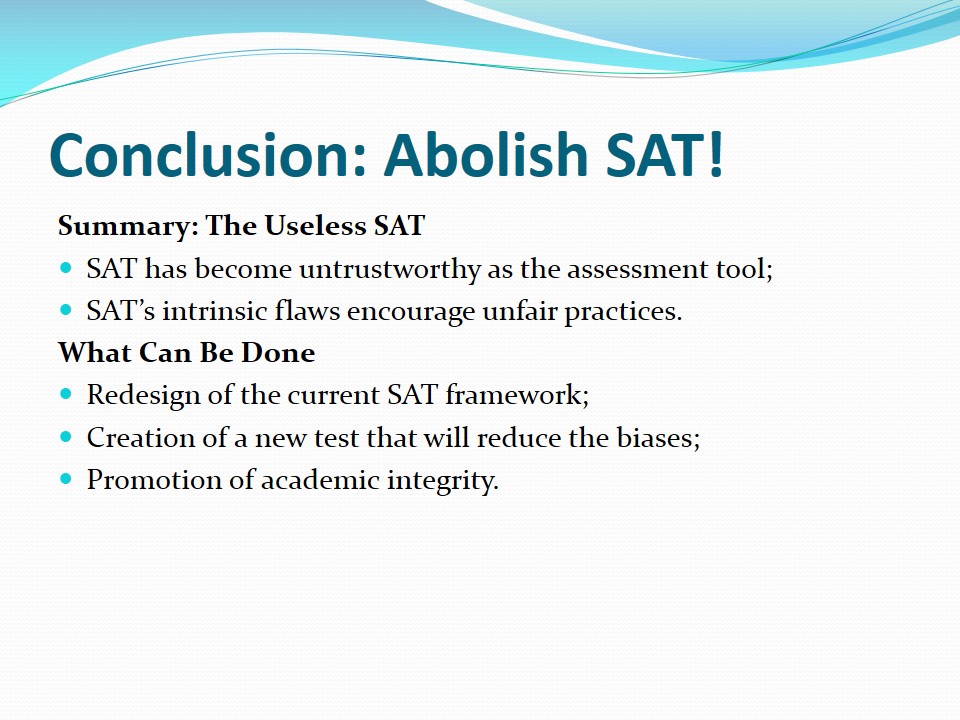Introduction: Why SAT Should Not Exist
SAT as the Key to Failure:
- Has been abandoned in several colleges;
- Raises serious concerns among teachers and parents;
- Has worn out its welcome as a measurement tool;
- No longer helps measure students’ knowledge;
- Generates revenue for College Board;
- Does not allow testing logical skills.
Despite the fact that SAT has been in existence for quite a while, it seems to have been failing to provide accurate assessment of students’ skills. Several colleges have already reconsidered the sue of SAT scores as the basis for admission (“SAT, ACT No Longer Required For Admission To 800 U.S. Colleges And Universities”). Furthermore, according to the U.S. statistics, there is a direct correlation between students’ SAT scores and their family income. Due to its controversy, SAT must be abolished (Schaeffer).

Support: SAT as the Cause of Concern
- The Test Is Coachable:
- Picking the right answer instead of applying knowledge;
- Without coaching, students have few chances to succeed.
- Cheating as the Goal:
- Use of modern technology opens a leeway for cheating;
- Students’ priorities shift from showcasing knowledge to passing the test, hence the tendency to cheat.
There are a number of reasons to discard SAT as the means of assessing learners’ knowledge and skills. The fact that, to pass the test, one should consider coaching as opposed to an in-depth learning process, should be mentioned first. Instead of actual acquisition of knowledge, learners are trained to pick the right answer to a SAT question (Hernandez).
Furthermore, the test can be cheated. With the help of IT gadgets such as smartphones, students can pass the SAT and get the required score (Stecklow and Dudley).

SAT: A Dubious Advantage
- In Defense of SAT:
- It has been in existence for years;
- It provides a framework for ranking students
- Why SAT Still Fails:
- Extremely biased ranking system;
- Failure to differentiate between skills and knowledge;
- The test is driven by profit;
- Students from poor backgrounds are disadvantaged.
To its credit, the concept of the test should be viewed as a rather objective way of assessing the learners’ knowledge. If it was not for the framework’s lack of flexibility, it might be considered worth remodeling. As an outline, the idea of ranking learners based on their ability to perform certain tasks is not bad; it is the execution that fails miserably. The test also does not allow learners from poor social backgrounds and belonging to different ethnicities to advance and enroll in a popular institution (Zinshteyn).

Conclusion: Abolish SAT!
- Summary: The Useless SAT:
- SAT has become untrustworthy as the assessment tool;
- SAT’s intrinsic flaws encourage unfair practices.
- What Can Be Done:
- Redesign of the current SAT framework;
- Creation of a new test that will reduce the biases;
- Promotion of academic integrity.
Because of the numerous biases surrounding it, SAT has become practically useless as the means of testing students’ knowledge and skills. The test, therefore, impedes the academic progress as opposed to promoting it. Consequently, it needs to be replaced with an adequate assessment system that will help evaluate learners’ skills and encourage them to focus on their academic success (Schwarz).

Works Cited
Hernandez, Michele. “Colleges Should Get Rid of the SAT and ACT and Abolish Preferences.” The New York Times. 2015. Web.
“SAT, ACT No Longer Required For Admission To 800 U.S. Colleges And Universities.” Huffington Post. 2015. Web.
Schaeffer, Robert. “New SAT Fails the Test: Opposing View.” USA Today. 2014. Web.
Schwarz, Barry. “Do College Admissions by Lottery.” The New York Times. 2015. Web.
Stecklow, Steve and Renee Dudley. “College Board Tightens SAT Exam Security, but Key Risk remains.” Reuters. 2017. Web.
Zinshteyn, Mikhail. “Will the New SAT Better Serve Poor Students?.” The Atlantics. 2015. Web.